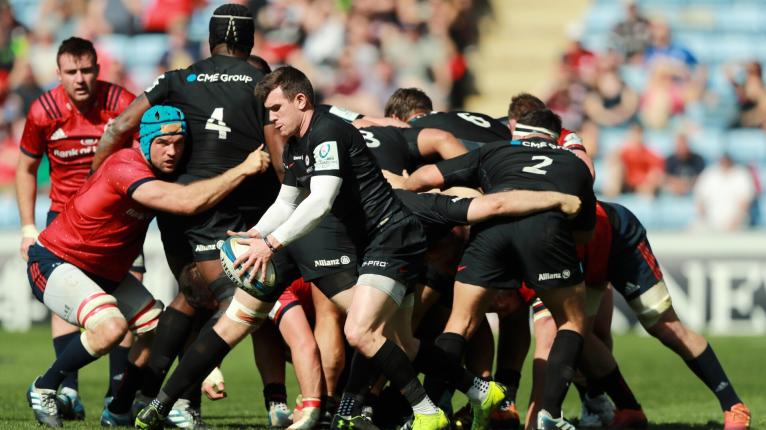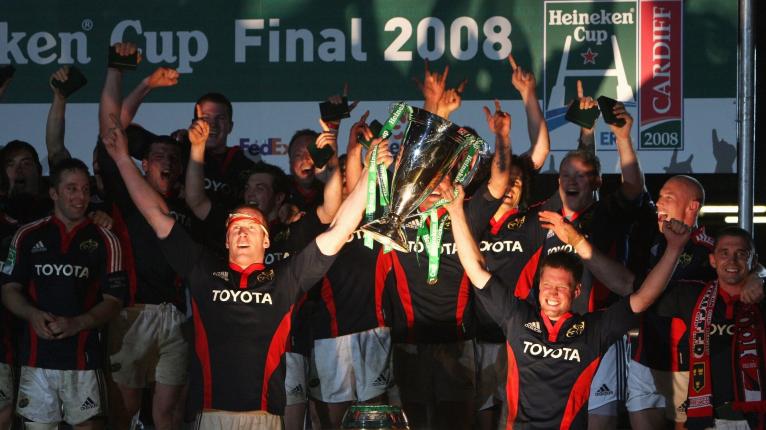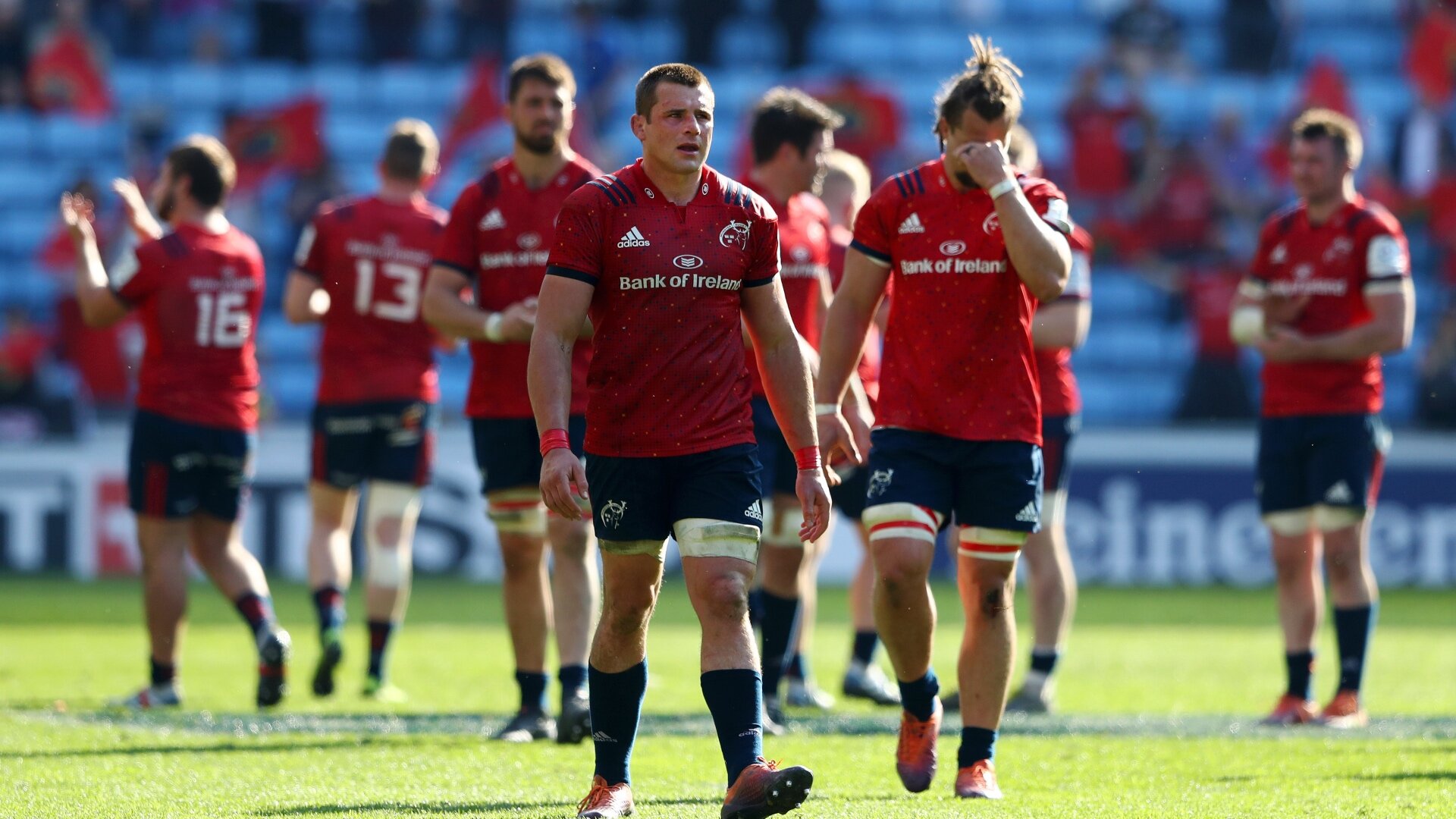It's insanity that a club of Munster's pedigree has lost so many successive European semi-finals

If the definition of insanity is to keep doing the same thing over and over, then Munster appear caught up in a warped cycle where the outcome isn’t going to change anytime soon unless they change themselves.
European semi-final sadly equals elimination when it comes to the Irish province these days, their trophy-winning exploits and their reaching of an enviable four finals in a nine-season spell consigned to the history books and replaced by a pattern where the pain is only getting worse judging by the lop-sided nature of recent last-four results.
Dublin, San Sebastian, Montpellier, Marseille, Dublin again, Bordeaux and Coventry is the sequence where the music keeps on stopping, their guilty feet left with no rhythm as they leave the dance floor for more superior teams to see out the season.
You could live with the situation somewhat in the old ERC European Cup era. Leinster sucker-punched them a decade ago in an all-Irish epic, Biarritz feasted on some ill-discipline down in Spain while the respective 2013 and 2014 losses to Clermont and Toulon witnessed Munster courageously going toe-to-toe over in France.
Since then, though, the narrative has worryingly altered in this EPCR Champions Cup era. Stand up and fight isn’t something Munster have done in their three recent semi-final exits, Saracens twice choking them either side of a first-half chastening by Racing.
(Continue reading below…)
Let’s not get sidetracked by the sideshows that emerged from Saturday’s latest surrender, the outrage over homophobic Billy Vunipola being awarded man of the match award and the dismissive attitude towards the limited amount of support Saracens attracted to the English midlands.
The only post-mortem debate from this Champions Cup semi-final should surround the result, the 32-16 double-score pounding which confirmed Munster continue to only make up the numbers when reaching the last-four rather than actually being a genuine contender to lift the trophy.
The first semi-final certainly didn't disappoint ?
A war of attrition at the Ricoh Arena, but it was @Saracens who remain unbeaten in the competition after battling past @Munsterrugby 32-16 ??
? #Heineken #ChampionsCup highlights ? pic.twitter.com/JnI4THpeMx
— Investec Champions Cup (@ChampionsCup) April 21, 2019
Accountability for results should firmly rest with the guy who picks the team, but recent developments at the club suggest that the current glass ceiling they are repeatedly failing to break through is viewed as an acceptable situation.
It was curious on the back of their fortunate quarter-final win over Edinburgh – the second fortunate quarter-final success of the van Graan era as they needed a late try to defeat Toulon 12 months ago in Limerick – that a coach whose initial deal would see him in situ anyway until summer 2020 had secured a contract extension a year early that will take him through until 2022.
The question that needs answering is why did Munster have to move so early to retain the services of the 39-year-old? On the surface it appears they are happy to reward a certain level of achievement rather than place a premium on achieving results higher up the scale and return to the club to the echelons they used occupy when Declan Kidney ran the rule.

It was all well and good for van Grann to claim in his contract extension media release that “moments and scenes in Edinburgh with the Munster supporters, players and management make for amazing memories”, but the trouble is that when it comes to the end of this season the lingering memory will now be of Saturday’s schooling by Saracens in Coventry.
The hope heading to England was that Munster would somehow demonstrate they had evolved from where they were two years ago when their Rassie Erasmus-led side was dished a lesson from Saracens in Dublin. However, too many similarities emerged between events at the Ricoh and the Aviva.
As was the case in 2017, Munster were blessed to only trail by three points at the interval before eventually cracking under relentless pressure early in the second half.
HOW MUNSTER’S RECENT COACHES COMPARE
RASSIE ERASMUS – W32 D1 L9 (76.1%)
Home – W19 L2 (90.4%), Away – W13 D1 L7 (61.9%)
JOHANN VAN GRAAN – W33 D2 L14 (67.3%)
Home – W21 D1 L1 (91.3%), Away – W12 D1 L13 (46.1%)
ROB PENNEY – W38 D1 L22 (62.2%)
Home – W23 D1 L5 (79.3%), Away – W15 L17 (46.8%)
ANTHONY FOLEY – W36 D2 L21 (61.0%)
Home – W22 L7 (75.8%), Away – W13 D2 L14 (44.8%)
Where was the innovation, where was the strategy to combat the inevitable Saracens onslaught that unfolded? That is what van Graan is employed to do, to provide potential solutions that just might get Munster over the line rather than lose by the exact same 16-point margin they were defeated by 24 months ago.
A few things stood out sorely. For all the rave reviews Tadhg Beirne has earned in recent seasons when establishing his reputation as a breakdown nuisance, recent outings in Coventry with Munster and with Ireland in Cardiff have demonstrated he now needs to take his game onto another level in these marquee matches.
Also, contrast the many more attacking options Owen Farrell seemed to have when possession came his way compared to when Tyler Bleyendaal was on the ball. Munster were limited and predictable in attack while Saracens regularly changed the point of their attack.
NEWS | We are pleased to confirm that Head Coach Johann van Graan has extended his contract for a further two years and will remain with the province until June 2022.
Full details > > https://t.co/AvpDBpdzby#SUAF ? pic.twitter.com/921xc4NEek
— Munster Rugby (@Munsterrugby) April 8, 2019
Skill level was another focus. For instance, why does replacement prop Stephen Archer appear allergic to handling the ball with proficiency? Competency with the pill is now part of every tighthead’s CV these days.
Also, Mike Haley was trumpeted as an Irish-qualified signing when he arrived in from the Premiership but there was a reason why he was playing for Sale and not one of the bigger clubs. It’s fair to say the experience of Racing’s Simon Zebo, whom Haley replaced, was missed in this European semi.
Then there was their overall level of belligerence. Munster were ultimately bullied and looked in dire need of a Will Skelton, a Scott Fardy, a Jerome Kaino type of overseas import. Someone who can deliver calmly and composed when the proverbial is hitting the fan, the sort of presence who can assist the likes of Jack O’Donoghue in becoming a leader rather than someone who can struggle to be consistently influential in tough going.

Identifying someone who can add this enforcer type bite to Munster should be at the top of van Graan’s must-do list, along with pressing the accelerator on the academy conveyor belt.
For a whole host of reasons, the talent coming through their system isn’t as plentiful compared to arch rivals Leinster and if the South African is really to make a success of his tenure through to 2022, he must start influencing the structures that surround the identification and education of the next wave of players.
There is some talent there already in the system – Munster accounted for six of Ireland’s starters in their Grand Slam-clinching under-20s win over Wales last month. But they are nowhere near a situation where they can confidently rely on a harvest of riches arriving in every year as happens in Dublin when kids get thrown in at the deep end early and thrive.
? VIDEO | Post-match press conference and behind the scenes of #SARvMUN > > https://t.co/gTSdabkXo6#SUAF ? pic.twitter.com/0blKFzDORA
— Munster Rugby (@Munsterrugby) April 20, 2019
As it stands, van Grann’s overall results do stand up when compared to some other recent coaches. His 67.3% win ratio eclipses Rob Penney and the late Anthony Foley, but he trails Erasmus’ 76.1% and must now figure our ways to get the very best out of his team now that he has the safety net of this extended contract.
He needs to realise that Munster, because of their European pedigree under Kidney, will always be measured by the trophies they win and he needs a squad with an unrelenting desire to selfishly be the best.
Too many of their leading players have played in too many Euro semi-finals defeats – Keith Earls, missing in Coventry through injury, has endured six losses, Dave Kilcoyne five, while Conor Murray, Peter O’Mahony and CJ Stander all check in with four. That’s frustrating for players of this calibre and they could do perhaps with taking an off-season read of Paul O’Connell’s autobiography.

Reflecting on the infuriating 2004 semi-final loss to Wasps, he wrote: “The real change that came from that day was that a core of players became more determined than ever before to make Munster successful.
“It wasn’t that the organisation got better. It was that the hardest trainers in the group drew on the Wasps defeat. That was what really made the difference.”
Two years later they were champions. Have van Graan and co got this stubbornness to make a similar leap?











































































